

Ishaq Al-Kooheji, the Executive Director of Learning and Development Department, Bahrain Institute of Public Administration (BIPA), has stated that BIPA works according to the comprehensive vision of His Majesty the King, while observing the sustainable development goals adopted by the United Nations. BIPA embeds the sustainable development goals 2030 in all its programs, a matter which reflects positively on the strategic path of government projects and initiatives introduced by the graduates of BIPA programs, particularly the National Program for Government Leadership Development. The program establishes a direct link between comprehensive sustainability and the graduates’ projects. Al-Kooheji made this statement in the joint IASIA-LAGPA conference, held in Lima, Peru on July 23 – 26, 2018, where he participated with two papers.
In his paper, which discussed embedding the sustainable development goals 2030 in the National Program for Government Leadership Development, Al-Kooheji shed light on the scientific methodologies and mechanisms adopted by the program as regards linking the sustainable development to the training content of BIPA programs. They gave the national cadres the opportunity to come up with government projects and initiatives that help achieve the sustainable development goals in a manner that benefits the Bahraini Community. He added that BIPA is considered to be the first training institute in the Arab region which embeds the sustainable development goals 2030 in its training programs, aiming to enhance the government work system through improving performance efficiency. It also aims at achieving comprehensive development through alignment of the goals and targets of sustainable development with its programs in order to sharpen the capabilities of the government leadership in implementing the public policies related to sustainable development.
Al-Kooheji said that embedding the sustainable development goals in the BIPA’s programs came in line with the comprehensive vision of His Majesty the King, particularly after the Kingdom of Bahrain introduced its volunteering report in front of the United Nations last July. It is also in alignment with BIPA’s strategic goals, which aim to provide advanced services up to the development aspirations and in line with the optimal leadership of the resources, which enable provision of these services, and the advanced policies in support of sustainable development, continuous change culture and creativity to achieve further development.
Al-Kooheji concluded by saying that embedding the sustainable development goals in the National Program for Government Leadership Development aims at transforming the sustainable development concept into a permanent government practice in the government work in the Kingdom of Bahrain. This is done through encouraging the leaders to create and think about strategic solutions for the current status of government work from an international perspective, which achieves the aspired benefits both domestically and globally.
